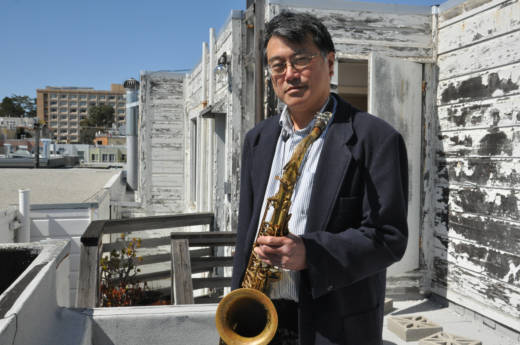“I showed up and it was just Francis and me,” says Jang, remembering how he immediately launched into an extended monologue informing Wong about saxophone legend John Coltrane and Amiri Baraka, the poet and playwright who wrote the seminal book on African-American music Blues People (under the name LeRoi Jones).
“When I finished, Francis pulled out a copy of the newspaper Unity from his backpack with an article by Baraka,” who by the 1980s had turned his attention to Marxist politics, and was the charismatic force behind the organization that employed Jang as an organizer.
That heady blend of radical politics, cutting-edge jazz, community organizing, and Asian-American consciousness has reverberated far beyond the Bay Area. On May 20, the Asian Art Museum presents “Asian Improv Nation: A 30th Anniversary Showcase,” featuring an ambitious program of music by Wong and Chicago bassist Tatsu Aoki, the founder and artistic director of Asian Improv aRts Midwest.
Music associated with Asian Improv often explores overlooked chapters in American history, like Jang’s 1996 piece about Angel Island, “Island: the Immigrant Suite No. 2,” for the Kronos Quartet and Cantonese opera singer Eva Tam. Another hallmark of Asian Improv productions is the ingenious combination of Western harmony and jazz’s improvisational practices with traditional Asian instruments and folk (and classical) forms.
Saturday afternoon’s concert brings together all of these elements with taiko drummers, hammered dulcimer virtuoso Yangqin Zhao and a Tokyo master of shamisen (Japanse three-string lute) joining forces with woodwind specialists Mwata Bowden and Edward Wilkerson, Jr., longtime members of the AACM, the Chicago black arts organization launched in the mid-1960s that provided a model for Asian Improv aRts.
The concert’s centerpiece is Wong’s “Miyoshi Sketches,” a work dedicated to John Miyoshi, who had been recruited from the Japanese-American internment camps during World War II to serve in U.S. military intelligence in the fight against Japan. A close friend of Wong’s parents, who immigrated to the Bay Area from China, Miyoshi “helped our family understand that ethnicity and political citizenship are different,” Wong says, noting the lingering bitterness in China over Japan’s brutal occupation in the 1930s and 40s.
“The piece is really about reconciliation that can happen in Asian-American contexts. Tatsu and I can play music together, but our parents were at war together. This could only happen in an Asian-American context. And it’s no coincidence that jazz and creative music is a vehicle for that being expressed.”
Born in Japan and raised in a family deeply involved in traditional Japanese arts, Aoki moved to the United States in 1977 to study experimental filmmaking at Art Institute of Chicago (where he’s now on faculty). Within a decade he’d become a major force on Chicago’s bustling art scene as a player and producer. He had come to the United States looking to shed his family’s ties to the traditional arts, but after encountering Asian Improv artists like koto expert Miya Masaoka, drummer Anthony Brown, bassist Mark Izu, and the late pianist Glenn Horiuchi, he started experimenting with traditional forms and went on to found the Chicago Asian American Jazz Festival, which celebrates its 22nd annual season in the fall.
“I was completely inspired by what they were doing at the time,” Aoki says. “I’m very grounded in the Chicago sound, and Jon and Francis and Mark had a different kind of sound, a Bay Area sound. When I left in Japan I didn’t want to do traditional music anymore, but their music influenced me to bring that back in Chicago. That’s why today I have shamisen and taiko.”
Another mark of the organization’s success is the brilliant work being done by second- and third-generation artists, like Indian-American pianist/composer Vijay Iyer, who was studying for a PhD in physics at UC Berkeley in the early 1990s when he realized that music was his true calling. A MacArthur “Genius” Fellow and Harvard University professor, Iyer is the artistic director of Cal Performances’ Ojai at Berkeley festival June 15-17.
In many ways, Iyer’s aesthetic vision was shaped by his early encounters with Asian Improv “seeing jazz musicians who were connecting with their Asian ancestry,” he says. “It sort of all made sense to me finally, that I could really be myself inside this music and that could be valued. They also provided a nurturing environment so I could do the same thing. It was Francis who said, why don’t you make a record for Asian Improv?” which led to Iyer’s first two albums, and a body of work that embodies the organization’s commitment to social change and bracing music.




